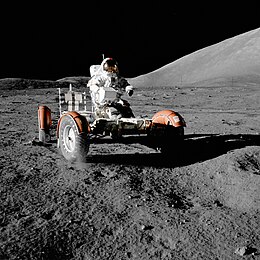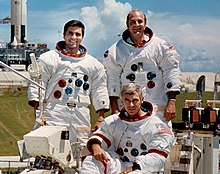Apollo 17

Eugene Cernan aboard the Lunar Rover during the first EVA of Apollo 17
|
|
| Mission type | Manned lunar landing |
|---|---|
| Operator | NASA |
| COSPAR ID |
|
| SATCAT no. |
|
| Mission duration | 12 days, 13 hours, 51 minutes, 59 seconds |
| Spacecraft properties | |
| Spacecraft |
|
| Manufacturer |
|
| Launch mass | 48,607 kilograms (107,161 lb) |
| Landing mass | 5,500 kilograms (12,120 lb) |
| Crew | |
| Crew size | 3 |
| Members | |
| Callsign |
|
| EVAs | 1 in cislunar space Plus 3 on the lunar surface |
| EVA duration | 1 hour, 5 minutes, 44 seconds Spacewalk to retrieve film cassettes |
| Start of mission | |
| Launch date | December 7, 1972, 05:33:00 UTC |
| Rocket | Saturn V SA-512 |
| Launch site | Kennedy LC-39A |
| End of mission | |
| Recovered by | USS Ticonderoga |
| Landing date | December 19, 1972, 19:24:59 UTC |
| Landing site | South Pacific Ocean 17°53′S 166°07′W / 17.88°S 166.11°W |
| Orbital parameters | |
| Reference system | Selenocentric |
| Periselene | 26.9 kilometers (14.5 nmi) |
| Aposelene | 109.3 kilometers (59.0 nmi) |
| Epoch | December 11, 4:04 UTC |
| Lunar orbiter | |
| Spacecraft component | Command/Service Module |
| Orbital insertion | December 10, 1972, 19:47:22 UTC |
| Departed orbit | December 16, 1972, 23:35:09 UTC |
| Orbits | 75 |
| Lunar lander | |
| Spacecraft component | Lunar Module |
| Landing date | December 11, 1972, 19:54:57 UTC |
| Return launch | December 14, 1972, 22:54:37 UTC |
| Landing site |
Taurus–Littrow 20°11′27″N 30°46′18″E / 20.19080°N 30.77168°E |
| Sample mass | 110.52 kilograms (243.7 lb) |
| Surface EVAs | 3 |
| EVA duration |
|
| Lunar rover | |
| Distance covered | 35.74 kilometers (22.21 mi) |
| Docking with LM | |
| Docking date | December 7, 1972, 09:30:10 UTC |
| Undocking date | December 11, 1972, 17:20:56 UTC |
| Docking with LM Ascent Stage | |
| Docking date | December 15, 1972, 01:10:15 UTC |
| Undocking date | December 15, 1972, 04:51:31 UTC |
| Payload | |
| Mass |
|
 Left to right: Schmitt, Cernan (seated), Evans |
|
Apollo 17 was the final mission of NASA's Apollo program, the enterprise that landed the first humans on the Moon. Launched at 12:33 a.m. Eastern Standard Time (EST) on December 7, 1972, with a crew made up of Commander Eugene Cernan, Command Module Pilot Ronald Evans, and Lunar Module Pilot Harrison Schmitt, it was the last use of Apollo hardware for its original purpose; after Apollo 17, extra Apollo spacecraft were used in the Skylab and Apollo–Soyuz programs.
Apollo 17 was the first night launch of a U.S. human spaceflight and the final manned launch of a Saturn V rocket. It was a "J-type mission" which included three days on the lunar surface, extended scientific capability, and the third Lunar Roving Vehicle (LRV). While Evans remained in lunar orbit in the Command/Service Module (CSM), Cernan and Schmitt spent just over three days on the moon in the Taurus–Littrow valley and completed three moonwalks, taking lunar samples and deploying scientific instruments. Evans took scientific measurements and photographs from orbit using a Scientific Instruments Module mounted in the Service Module.
...
Wikipedia

